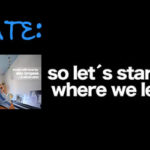
“No way of doing things is beyond improvement.”
I love Edwin de Bono’s quote above. Read it in the column I am featuring today, written by Thomas Oopong.
How about keeping that quote in mind so you don’t break your own back patting it?
Yes. How about: not only could someone else be doing what I am doing – better – but SO COULD I!
Don’t you just love pushing your lazy self-serving brain around? No? What’s the risk? You might change your mind?
Awwwwwwwww… well don’t look for no sympathy here.
AND…have a good week.
Vicki
How to Use Lateral Thinking to Remove Unnecessary Cycles in Life (excerpt)
by Thomas Oopong
You’d be forgiven if you think lateral thinking is something that only works in the creative industry. After all, who would need to think outside the box in real life? The answer is everyone.
Anyone can find themselves in a situation where traditional thinking simply won’t cut it. It could be a job interview, clarifying a new idea, making a life-changing decision, or another challenge you face daily.
Thinkers like Albert Einstein, Charles Darwin, and Thomas Edison all had one thing in common: they were all masters of lateral thinking.
They were able to view problems from unusual angles, coming up with creative or original solutions that others simply couldn’t see.
In reality, we all have to think outside of the box from time to time, especially when we aim to minimize regrets later in life. (…)
Thinking laterally is going against conventional wisdom and approaching issues from a different angle.
It’s about looking for unconventional solutions to conventional problems. It’s not something that we can switch on or off whenever we want — lateral thinking becomes second nature after practice.
When usual methods aren’t working, and you need a new way of approaching a problem, lateral thinking can help. Or, when your present set of mental models or thinking patterns are not delivering the results you expect or want, lateral thinking can help you navigate the obstacles in life.
Sometimes, the best way forward is to think backwards, think beyond first principles, and question our assumptions, beliefs, and conventional wisdom.
The best or rational way forward can also mean entertaining the idea of being wrong — keeping an open mind about the way forward.
“Everyone has the right to doubt everything as often as he pleases and the duty to do it at least once. No way of looking at things is too sacred to be reconsidered. No way of doing things is beyond improvement,” says Edward de Bono.
Everyone has those moments of inspiration where a lightbulb goes off, and we have an aha moment. These moments come more frequently than others for some people, but how can you make them happen more often?
Whether it’s solving a problem, coming up with a new idea, or just generally thinking outside the box, thinking beyond the obvious is something that many of us struggle with from time to time.
In everyday life, lateral thinking can help you to develop as a person, find new solutions to everyday problems, and live a more fulfilled life.
We should always be in the business of looking at things in a new way — it’s the only way to eliminate mistakes, errors in judgement and the many processes that no longer serve us.
I like what Richard P. Feynman once said, “The first principle is that you must not fool yourself and you are the easiest person to fool.”
How to incorporate lateral thinking into your day-to-day life
“Lateral thinking is an escape from the virtual “thought” prison we’ve built with materials from our education, experiences, and those that we allow to influence us.”
~Michael Muxworthy
Don’t jump to conclusions for every challenge in life — examine the many options and their consequences. Ask more profound questions — what are the second and third-order consequences of this path?
Be open to alternatives you normally ignore. When in doubt, write down the many approaches you are considering and how they will help your future self lead a better life. (…)
At your present job, do you have opportunities for personal growth? Do you have time to learn skills that can make you indispensable? Are you in it for the money or opportunities for self-improvement? (…)
For every area of your life (health, finance, relationships etc.), question your present routines and habits. Experiment with new or improved habits. (…)
What can you change in life to improve your present life? Are your current actions in life helping you become a better or worse version of yourself? Are there better ways to do the same things you are doing? Are you open to trying new habits to improve your health, finance or become wise?
Lateral thinking isn’t about coming up with wild or crazy ideas; it’s about exploring ideas and every day solutions differently. Sometimes the obvious answer is correct, but more often than not, there’s something deeper and more meaningful than what first meets the eye. (…)






























